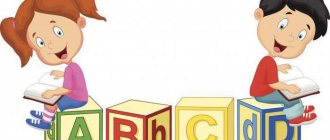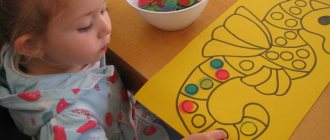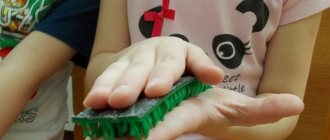Leave your comment
Gift certificates
Responsibility for resolving any controversial issues regarding the materials themselves and their contents is taken by the users who posted the material on the site. However, the site administration is ready to provide all possible support in resolving any issues related to the work and content of the site. If you notice that materials are being used illegally on this site, please notify the site administration using the feedback form.
All materials posted on the site were created by the authors of the site or posted by users of the site and are presented on the site for informational purposes only. Copyrights for materials belong to their legal authors. Partial or complete copying of site materials without written permission from the site administration is prohibited! The opinion of the administration may not coincide with the point of view of the authors.
Source
Rainbow-talents.RF
author: Sikorskaya Lyudmila Borisovna
teacher of MBDOU “Kindergarten No. 141 “Ladushki”, Dzerzhinsk, Nizhny Novgorod region.
“Development of children’s speech through familiarization with fiction” (junior group)
Municipal budgetary preschool educational institution "Kindergarten No. 141 "Ladushki"
Professional self-development program:
“Development of children’s speech through familiarization with fiction”
Developer:
teacher of category I
Sikorskaya L.B.
Dzerzhinsk, 2022
Target:
development of understanding of speech, ability to imitate, accumulation of vocabulary, formation of speech as a means of communication with others.
Tasks:
- Study methodological literature on this topic.
- Introduce children to various works of art (fairy tales, nursery rhymes, jokes, poems).
- To form the need for communication, teach to listen to figurative speech.
- Development of active speech (reproduction of short sentences, phrases, through the formation of the ability to communicate on various occasions with adults, children, ask questions, convey previously received impressions in a few words, phrases.
- Develop the ability to reproduce movements in accordance with the text, reproduce sound combinations, words, memorize small interesting texts.
Plan for working with children
| No. | event title | Time spending |
| 1 | Diagnostics of skills and knowledge in the field of fiction | September |
| 2 | Introduce RNS "Repka" | September |
| 3 | Fix the RNS "Turnip" using a tabletop theater | September |
| 4 | Finger games based on rhymes | October |
| 5 | Getting to know the nicknames | October |
| 6 | Introduce A. Barto’s poem “Horse” | November |
| 7 | Learning the poem “Horse” by A. Barto using dramatization | November |
| 8 | Introduce the RNS "Masha and the Three Bears" | November |
| 9 | Introduce the nursery rhyme “Ay dudu, dudu, dudu” | December |
| 10 | Learning the nursery rhyme “Like our cat” | December |
| 11 | Introduce the joke - the joke “There was a cat walking” | December |
| 12 | Introduce S. Cherny’s poem “Pstavalka” | January |
| 13 | Learning the nursery rhyme “Goat Trouble” | January |
| 14 | Introduce the RNS “The Wolf and the Seven Little Goats” | February |
| 15 | Learning a song from the RNS “The Wolf and the Seven Little Goats” | February |
| 16 | Introduce RNS "Teremok" | March |
| 17 | Repeat RNS "Teremok" with a theatrical performance | March |
| 18 | Introduce A. Brodsky’s poem “Sunny Bunny” | April |
| 19 | Reading Charushin's story "Chicken" | April |
| 20 | Reading the nursery rhyme "Pussy" | May |
| 21 | Learning the nursery rhyme “Pussy” | May |
| 22 | Diagnostics of skills and knowledge in the field of fiction | May |
Plan for working with parents
| No. | event title | Time spending |
| 1 | Consultation “Teaching poetry with your child” (see appendix) | September |
| 2 | Consultation “Fairy tales in the development of children’s speech” (see appendix) | October |
| 3 | Repeat A. Barto’s poem “The Horse” at home | November |
| 4 | Consultation “Pestushki, nursery rhymes, and jokes” (see appendix) | December |
| 5 | Consultation “Raising children through the literary word” (see appendix) | January |
| 6 | Reinforce the song from RNS “The Wolf and the Seven Little Goats” at home | February |
| 7 | Consultation “Teach your child to speak beautifully” (see appendix) | March |
| 8 | Repeat A Barto’s poem “Bunny” at home | April |
| 9 | Consultation “The importance of finger games in the development of children’s speech” (see appendix) | May |
The development of coherent speech is an important component of the education of a culture of speech in the broad sense of the word, which is understood as compliance with the norms of the literary language, the ability to convey one’s thoughts, feelings, ideas in accordance with the purpose and purpose of the statement in a meaningful, grammatically correct, accurate and expressive manner.
Speech becomes figurative, direct and lively if the child develops an interest in linguistic wealth and develops the ability to use a wide variety of expressive means in his speech.
The most important sources for the development of expressiveness of children's speech are works of fiction and oral folk art, including small folklore forms (proverbs, sayings, riddles, nursery rhymes, counting rhymes, phraseological units).
The formation of imagery should be carried out in unity with the development of other qualities of a coherent statement, based on ideas about the compositional features of a fairy tale, story, poem, a sufficient supply of figurative vocabulary and an understanding of the appropriateness of its use in one’s own writings.
In the younger group I use works of different genres. I teach children to listen to fairy tales, stories, poems, and also to follow the development of actions in a fairy tale, to sympathize with the positive characters. Constantly drawing children's attention to the figurative language of fairy tales, stories, poems, attracting children to repeat individual words, expressions, songs of characters that they remember. For example, after listening to the fairy tales “The Wolf and the Seven Little Goats” and “Kolobok”, the children were asked to repeat the songs of the characters. By mastering the content of fairy tales: “Teremok”, “Zayushkina’s hut”, “Three Bears”, children learn to convey the words of different heroes. They repeat the intonations that we pronounce, but this also lays the foundation for further independent development of intonation expressiveness at an older age.
Application
- Consultation “Teaching poetry with your child”
Method number 1.
In order for a child to easily and well remember the rhyme, it is necessary to introduce him to the “melody” of the poem and should start as early as possible. If you read ri, “Our Tanya is crying loudly” to a very little baby, then when the child grows up, this first experience, embedded in the subconscious, will make it easier for him to take a conscious approach to the process of memorization. It is known that the most favorable age for memorizing poems is 4-6 years. It is during this age period that the baby’s memory begins to develop especially quickly. If, until the age of four, we do not set the child the task of memorizing a piece, but simply “recite” a number of them - what he remembers, he will remember, then after four years we purposefully teach the child to memorize the text by heart. Moreover, you need to learn as much as possible - this is the best way to form the amount of memory necessary for learning.
Method No. 2
To quickly learn by heart, it is advisable to choose poems whose content would correspond to the age and temperament of the child. There is no need to force a four-year-old child to memorize “Lukomorye” by A. Pushkin in order to show his “genius”. It is best to learn children's classics by S. Mikhalkov, A. Barto, K. Chukovsky.
Method number 3.
Before starting to memorize, the adult who will learn the poem with the child must read it himself with expression. It’s even better if an adult knows it by heart. Then you should definitely find words in the text that are unfamiliar or incomprehensible to the child and explain them. When all the words have been explained, the poem needs to be written about







